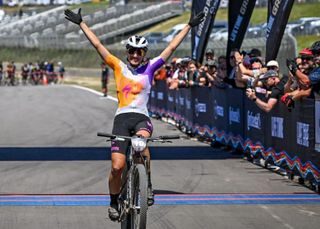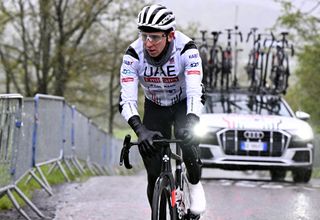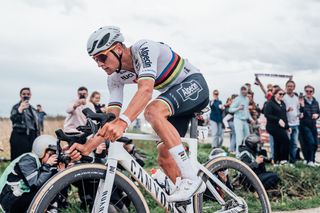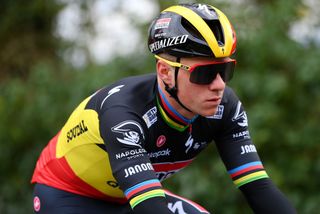Tour of Flanders 2018 - Preview
Sagan has the odds, Quick-Step Floors have the numbers for De Ronde











When the Tour of Flanders finish was moved to Oudenaarde in 2012, and the Oude Kwaremont and Paterberg placed as the final obstacles, there were concerns that the alterations would make the race too predictable.
Bora-Hansgrohe name team to back Peter Sagan at Tour of Flanders
Strong Classics campaign makes Benoot a favourite for Tour of Flanders
Lampaert: I'm on the same level as Gilbert, Terpstra, Stybar for Tour of Flanders
Valverde skips Tour of Flanders
Oliver Naesen confident for Tour of Flanders
Kwiatkowski joins Sky for Tour of Flanders
Gent-Wevelgem and Dwars door Vlaanderen analysis, Tour of Flanders preview – Podcast
Vanmarcke and Langeveld extend contracts with EF Education First-Drapac
UAE Team Emirates build team around Kristoff for Tour of Flanders - News Shorts
Vincenzo Nibali ready to broaden his repertoire at the Tour of Flanders
Vanmarcke willing to gamble and ready to sprint at Tour of Flanders
Benoot: The Tour of Flanders is the race of my dreams
Van Aert ready for Tour of Flanders debut
Oliver Naesen confirms Tour of Flanders ambitions
Tour of Flanders tactics: How do you solve a problem like Quick-Step?
Peter Sagan and Specialized launch 'Sagan Collection' - Gallery
While the old parcours over the Muur and Bosberg to Meerbeke demanded a delicate blend of strategy and strength, the balance of the new course seemed to have been tipped in favour of raw power.
Last year's page-turner, however, might well have proved a watershed for the new course.
Philippe Gilbert had to be unfathomably strong, of course, to win after a 55-kilometre solo raid, but his victory owed much to the canny tactics of his Quick-Step Floors squad, and even a little to the vagaries of fortune: had Greg Van Avermaet (BMC Racing Team) and Peter Sagan (Bora-Hansgrohe) not crashed on the final ascent of the Kwaremont, it might all have been so very different.
The 2018 edition of the Tour of Flanders promises more in the same vein. In the early years on the new parcours, most teams' tactics seemed to boil down to waiting for the final lap over the Kwaremont and Paterberg and then trying to hang on when the year's strongman attacked.
Now, the tactical canvas has broadened considerably, while the list of riders with genuine aspirations of victory is arguably at its longest since the change in route.
Subscribe to the Cyclingnews Podcast!
The contenders
The clash between the collective might of Quick-Step Floors and the extravagant individual gifts of men like Sagan and Van Avermaet looks likely to set the tone for Sunday's race. Gilbert, E3 Harelbeke winner Niki Terpstra, Dwars door Vlaanderen winner Yves Lampaert and Zdenek Stybar will all start on an equal footing for Patrick Lefevere's team, with the objective being to isolate and then out-manoeuvre Sagan et al.
Over the past week or so, Quick-Step have managed that task with aplomb, with Sagan's victory at Gent-Wevelgem their only defeat on Belgian roads since Opening Weekend. Gilbert has not yet shone as brightly as he had done at this point in 2017, but Terpstra is riding with considerably more confidence than he was a year ago. It is difficult to imagine a scenario in which Quick-Step do not have a numerical advantage entering the final hour of racing.
Despite Quick-Step's depth, Sagan is the bookmakers' favourite by dint of pedigree and form. A subdued showing at E3 Harelbeke – he crashed early on – raised questions, but a third Gent-Wevelgem victory two days later answered them almost as swiftly. If the triple world champion is in the front group come the final haul up the Kwaremont, it will be increasingly difficult to deny him a second Ronde. It will be interesting, too, to see how his teammate Daniel Oss is deployed before the finale.
Van Avermaet seemed to forget how to lose last spring, but has found victory rather harder to come by this time around. 'Gouden Greg' has, in short, been good but not golden. The Olympic champion's BMC team has disappointed so far, but he insists his own form is comparable to that of a year ago. He also maintains that he is one of the few riders equipped to deal with the greater distance of the Ronde and knows that his (relative) travails this Spring will be immediately forgotten with victory in the race he covets above all others.
Tiesj Benoot (Lotto Soudal) was one of the outstanding performers every time the road climbed at E3 Harelbeke and Dwars door Vlaanderen, and arrives buoyed by his maiden professional victory at Strade Bianche earlier in the month. 5th in his Ronde debut in 2015, the 24-year-old will expect to better that showing here.
Sep Vanmarcke (EF-Drapac) is a man with a seemingly innate gift for riding on the cobbles and he has been a consistent force this spring, like in years past. The great problem for the 29-year-old has always been a relative lack of punch. He undoubtedly has the strength to get into a winning position, but does he have the incisiveness to finish it off?
Michal Kwiatkowski (Team Sky), on the other hand, has yet to ride on the pavé this spring, but his past cameos in this part of the world – not to mention his form on other terrains in 2018 – make him a contender for victory. Gianni Moscon may be better suited to Paris-Roubaix, but the Italian provides a useful foil for Kwiatkowski, together with Dylan van Baarle.
The most intriguing name of the start list is that of Vincenzo Nibali (Bahrain-Merida), who makes his Ronde debut fresh from his dramatic Milan-San Remo triumph a fortnight ago. Logic says the Italian ought not to match Sagan, Gilbert et al on Sunday, but it would be equally surprising if he came and went without making an impression.
Oliver Naesen (AG2R La Mondiale), meanwhile, will just hope that his name appears on the start list and take it from there after he injured his knee in a crash at Dwars door Vlaanderen on Wednesday. 2015 winner Alexander Kristoff (UAE-Team Emirates) has endured a low-key cobbled Classics campaign to this point, but will hope against hope that the sheer length of the Ronde will play to his strengths of endurance.
Elsewhere, the Ronde debut of cyclo-cross world champion Wout Van Aert (Veranda's Willems-Crelan) will draw considerable attention after his assured performances on the road to date, while Orica-Scott's Matteo Trentin and Luke Durbridge, Jasper Stuyven (Trek-Segafredo), Mike Teunissen (Sunweb) and Michael Valgren (Astana) will be among those aiming to survive deep into the finale.
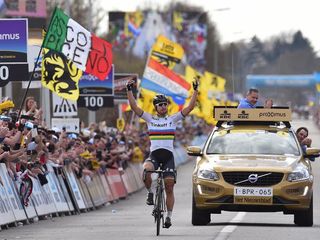
The parcours
After each being roared onto the podium by the huge crowds in Antwerp's Grote Markt, the riders will set off alongside the river to being the journey of 267 kilometres. In its second edition with the Antwerp start, the parcours is pretty much unchanged from 12 months ago, with 18 hellingen – the short, sharp, and often cobbled climbs that characterise the Flemish Ardennes – on the menu.
It takes a fair while just to get to that playground from Antwerp, and the opening 80 or so kilometres represent a preamble. The first test comes in the form of the two cobblestone sectors – Lippenhovestraat and Paddestraat – back-to-back after 87 kilometres, but it's not until 120 kilometres in (nearly the half-way mark) that we have the first climb of the day. And it's the emblem of the new Flanders course, the Oude Kwaremont. Achingly long at 2.2km and with a constantly shifting gradients – averaging a meagre 4% but including stretches at 12 – it will be visited three times over the course of the day, playing a crucial role later on.
Ten kilometres later is the Kortekeer climb, followed by the Edalareberg, a new introduction given the roadworks on the Eikenberg. The Wolvenberg then leads into the Holleweg sector of cobbles, and it's not long before the Haghoek-Leberg combination as seen in Omloop Het Nieuwsblad. By this point De Ronde is really getting into its swing, and soon come the Berendries and Tenbosse climbs.
The greatest anticipation, however, will be reserved for the Muur van Geraardsbergen, the iconic cobbled climb with the chapel at the top that played host to so many memorable moments in the past. It was cruelly axed when the organisers changed the finish from Meerbeke to Oudenaarde, but was reintroduced last year, albeit some 95km from the line. That didn't stop Tom Boonen, Philippe Gilbert et al using it to form the first selection from where the race would be won, and 'Kapelmuur' is expected to play a big role again. Those who were caught napping 12 months ago won't be making the same mistake twice.
There's plenty of time for the dust to settle and groups to get organised in the aftermath of the Muur, with nearly 20km until the next climbs, the Pottelberg and Kanarieberg. There's another brief stretch before the race really heats up again at the foot of the Oude Kwaremont. Appearing for the second time with 55 kilometres remaining, this time it's serious. This is where Philippe Gilbert went solo last year. It's followed by a zippy downhill run to the short but ultra-steep Paterberg in the first pairing of the two climbs.
The riders swoop down off the Paterberg but soon hit more punishing gradients at the Koppenberg, one of the hardest climbs on the menu with an average gradient of almost 10%. The riders then head to the cobbles of Mariaborrestraat, leading into the Steenbekdries climb, which in turn is followed by the Stationsberg descent and then the Taaienberg – Tom Boonen's beloved climb but the one that ended his chances in his final Ronde.
That stretch, from the bottom of the Oude Kwaremont to the top of the Taaienberg, with five gruelling climbs in the space of less than 20 kilometres, is a crucial phase of the race.
The next climb comes with 27km to go and combines the Kruisberg and Hotond for one long climb of 2.5km. It could deliver a further shake-up but it's all eyes on the Oude Kwaremont and Paterberg once again for the endgame. The combination will be key to deciding the winner – those with the legs have their final chance to strike out, those without have nowhere to hide, especially on the second half of the Paterberg.
There are 12 potentially nail-biting kilometres that separate the top of the Paterberg from the finish line in Oudenaarde, where the winner will go down in cycling history.
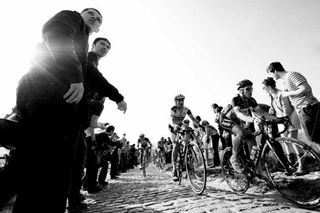
Hellingen
- 121.1km – Oude Kwaremont (2200m, 4%)
- 131.7km – Kortekeer (1000m, 6.4%)
- 138.6km – Edelareberg (1500m, 4.2%)
- 142.1km – Wolvenberg (645m, 7.9%)
- 151.0km – Leberg (950m, 4.2%)
- 155.0km – Berendries (940m, 7%)
- 160.0km – Tenbosse (450m, 6.9%)
- 170.4km – Muur van Geraardsbergen (750m, 9%)
- 189.0km – Pottelberg (1353m, 6.5%)
- 194.8km – Kanarieberg (1000m, 7.7%)
- 210.7km – Oude Kwaremont (2200m, 4%)
- 214.2km – Paterberg (360m, 13%)
- 220.8km – Koppenberg (700m, 9.4%)
- 226.2km – Steenbekdries (700m, 5.3%)
- 228.7km – Taaienberg (530m, 6.6%)
- 240.0km – Kruisberg-Hotond (2500m, 5%)
- 249.8km – Oude Kwaremont (2200m, 4%)
- 253.3km – Paterberg (360m, 13%)
Kasseien
- 87.3km – Lippenhovestraat (1300m)
- 88.8km – Paddestraat (2300m)
- 142.2km – Holleweg (350m)
- 148k.0m – Haghoek (2000m)
- 224.9km – Mariaborrestraat (2400m)

Thank you for reading 5 articles in the past 30 days*
Join now for unlimited access
Enjoy your first month for just £1 / $1 / €1
*Read any 5 articles for free in each 30-day period, this automatically resets
After your trial you will be billed £4.99 $7.99 €5.99 per month, cancel anytime. Or sign up for one year for just £49 $79 €59

Join now for unlimited access
Try your first month for just £1 / $1 / €1
Get The Leadout Newsletter
The latest race content, interviews, features, reviews and expert buying guides, direct to your inbox!
Most Popular
Latest on Cyclingnews
-
Swenson and Villafañe defend Fuego XL titles to take top spots at Life Time Grand Prix
Vermeulen holds off Beers in men's division while newcomer Sheppard takes second ahead of Otto in women's race -
Tadej Pogačar missing Evenepoel as he prepares to battle Van der Poel at Liège-Bastogne-Liège
Slovenian wants Vingegaard back for Tour de France but says 'the clock is ticking' on recovery -
Mathieu van der Poel's 'batteries recharged' for battle with Pogačar in Liège-Bastogne-Liège
Dutch rider foregoes recon ride Friday in cold-weather Belgium after four days in Spain -
‘The pain is getting less and less’ - Remco Evenepoel optimistic after Itzulia crash
Belgian reveals the dynamic of his crash and his hopes for the Tour de France and Paris Olympics
